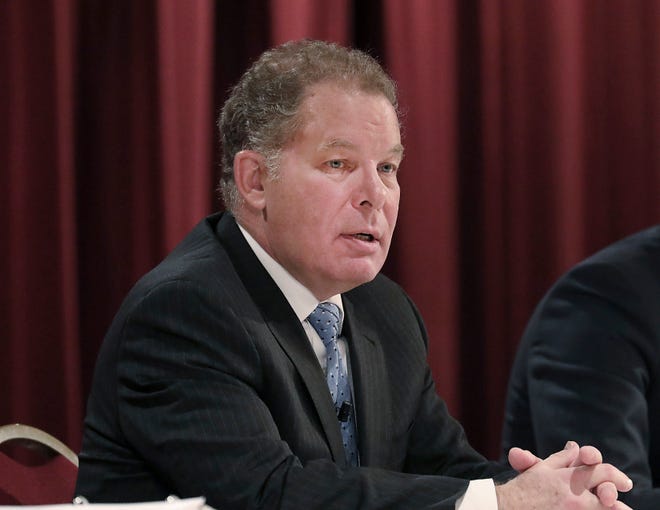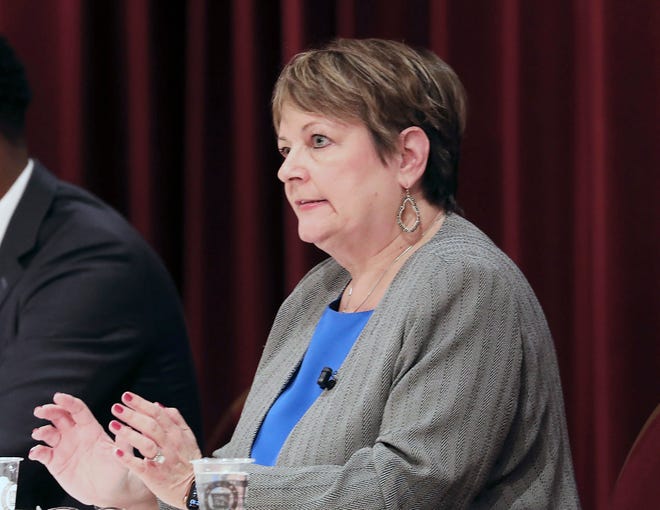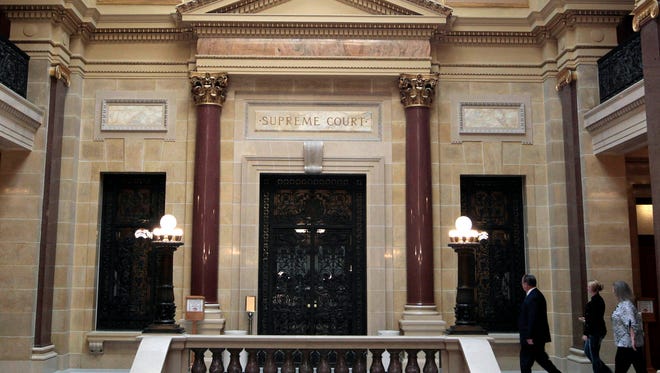Wisconsin’s spring Supreme Court election is shaping up to be one of the most expensive and most watched races in the country.
Four candidates — two conservatives and two liberals — are running for conservative Justice Patience Roggensack’s seat and the outcome could change the ideological makeup of a court that is expected to decide a number of high-profile issues including abortion and state election maps.
Conservatives now hold a 4-3 majority. The April ballot will pit the top two finishers in the Feb. 21 primary.
Who are the current Wisconsin Supreme Court justices?
- Chief Justice Annette Kingsland Ziegler, conservative, term ends 2027.
- Ann Walsh Bradley, liberal, term ends 2025.
- Patience D. Roggensack, conservative, term ends 2023, not seeking re-election.
- Rebecca Grassl Bradley, conservative, term ends 2026.
- Rebecca Frank Dallet, liberal, term ends 2028.
- Brian Hagedorn, conservative, term ends 2029.
- Jill J. Karofsky, liberal, term ends 2030.
Who are the 2023 Supreme Court candidates?

Jennifer Dorow, conservative
Dorow, 52, of Hartland, was appointed to the Waukesha County court in 2011 by former Republican Gov. Scott Walker. Before being appointed to the bench, Dorow worked as a defense attorney and as a prosecutor in the Waukesha County district attorney’s office. She is familiar to many voters after presiding over the high-profile trial of Darrell Brooks. Dorow sentenced Brooks to hundreds of years in prison for killing six people and injuring dozens more when he drove through the Waukesha Christmas parade in 2021.

Daniel Kelly, conservative
Kelly, 58, of North Prairie, is running again for a seat on the Supreme Court after serving for four years before losing in 2020 to Justice Jill Karofsky. While he was a member of the Supreme Court, Kelly wrote a decision that found Madison could not bar guns on its buses, argued the U.S. Supreme Court decision legalizing same-sex marriage undermined democracy, compared abortion to murder, and praised a decision that upheld Act 10, the 2011 law that scaled back collective bargaining for public workers.

Everett Mitchell, liberal
Mitchell, 45, of Windsor, was elected to the Dane County court in 2016 and is the presiding judge of the juvenile division. He oversees cases within the county’s high-risk drug court program. Mitchell is a former prosecutor for the county and was the director of community relations at the University of Wisconsin-Madison.

Janet Protasiewicz, liberal
Protasiewicz, 60, of Franklin, was first elected to the Milwaukee County bench in 2013 after working as a Milwaukee County prosecutor for nearly three decades. She has focused on prosecuting domestic abuse cases and other violent crimes.
What do the Supreme Court justices do?

When Wisconsin was established as a state in 1848, it was divided into five judicial districts that met once a year as a “Supreme Court.” The formal Supreme Court was created by the Legislature in 1853 and in 1903, the court was increased from five members to seven.
The seven justices are elected to 10-year terms in statewide non-partisan elections, although because of the nature of the cases the court decides, the races often attract outside special interest groups that donate money to candidates. Justices are eligible to run for re-election.
The Supreme Court has appellate jurisdiction over all Wisconsin courts and has discretion to determine which appeals it will hear. The Supreme Court may also hear cases that begin in the high court, known as original actions. In addition, the Supreme Court has administrative authority over all courts in Wisconsin.
What are some of the recent past high-profile rulings?
New election maps
In April 2022, the court ruled 4-3 in favor of a legislative redistricting plan drawn by Republican lawmakers. The new maps tilt heavily in Republicans’ favor, with 63 of the 99 Assembly seats and 23 of the 33 Senate seats leaning toward the GOP, according to an analysis by the Milwaukee Journal Sentinel.
Absentee ballot drop boxes are illegal
Four weeks before statewide primaries, the court’s conservative majority ruled 4-3 that voters casting absentee ballots couldn’t return their ballots to the drop boxes that became commonplace during the coronavirus pandemic.
Walker holdover appointee on DNR board can keep his post
Frederick Prehn was allowed to remain on Wisconsin’s Natural Resources Board beyond the expiration of his term, following a 4-3 Supreme Court ruling, against the request of Attorney General Josh Kaul who sought to force Prehn to vacate. Prehn finally resigned Dec. 30, 2022, nearly two years after his term ended.
Coronavirus decisions
In May 2020, two months into the coronavirus pandemic, the Supreme Court sided with Republican lawmakers and struck down Gov. Tony Evers’ stay-at-home order that closed businesses to limit spread of the virus.
Two years later, the Supreme Court voted 4-3 that local health departments have the authority to issue public health orders without getting permission from elected officials first.
Upholding Joe Biden’s victory over Donald Trump
In a 4-3 ruling in which Hagedorn broke with conservatives and sided with the court’s liberal justices, the state Supreme Court upheld Joe Biden’s Wisconsin win over Donald Trump in the 2020 election.
Chrystul Kizer allowed to invoke immunity defense in homicide case
The court ruled 4-3 that Chrystul Keizer could be allowed invoke in her defense a state law that offers immunity to sex trafficking victims for crimes committed as a “direct result” of being trafficked. She was 17 in 2018 when she was charged with the first-degree intentional homicide of Randall P. Volar III, 34, of Kenosha.
Prosecutors say she went to Volar’s home on June 5, 2018, shot him in the head, set a fire in his home and stole his BMW, computer and cash. They say it was a premeditated crime to steal the car. But Kizer’s lawyers argued she snapped after years of abuse by Volar.
Why is the 2023 Supreme Court race important?
With Patience Roggensack’s term ending and the seat up for grabs, the outcome of the election could detrermine whether the conservative or liberal factions of the court hold a 4-3 majority, something conservatives held with Roggensack on the bench. The leaning of the court could prove decisive in potential upcoming decisions on Wiscosin’s abortion laws, electoral maps that give Repubublicans out-sized majorities in the Legislature and rulings on Wisconsin’s election laws leading into the 2024 presidential and U.S. Senate elections.
The top two finishers in the Feb. 21 primary will face each other in the April 4 general election.
